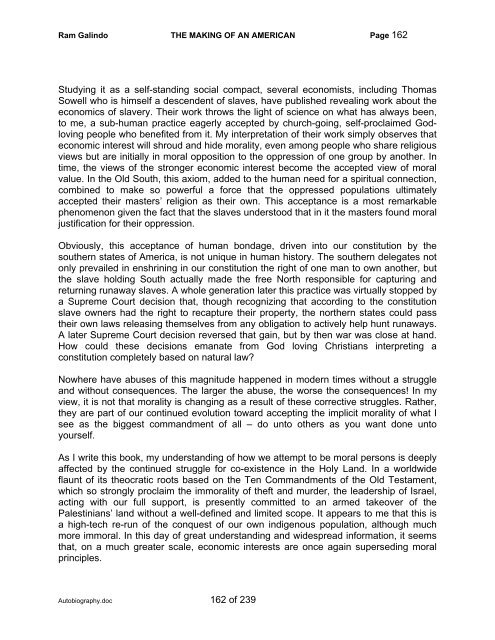Autobiography - The Galindo Group
Autobiography - The Galindo Group
Autobiography - The Galindo Group
You also want an ePaper? Increase the reach of your titles
YUMPU automatically turns print PDFs into web optimized ePapers that Google loves.
Ram <strong>Galindo</strong> THE MAKING OF AN AMERICAN Page 162<br />
Studying it as a self-standing social compact, several economists, including Thomas<br />
Sowell who is himself a descendent of slaves, have published revealing work about the<br />
economics of slavery. <strong>The</strong>ir work throws the light of science on what has always been,<br />
to me, a sub-human practice eagerly accepted by church-going, self-proclaimed Godloving<br />
people who benefited from it. My interpretation of their work simply observes that<br />
economic interest will shroud and hide morality, even among people who share religious<br />
views but are initially in moral opposition to the oppression of one group by another. In<br />
time, the views of the stronger economic interest become the accepted view of moral<br />
value. In the Old South, this axiom, added to the human need for a spiritual connection,<br />
combined to make so powerful a force that the oppressed populations ultimately<br />
accepted their masters’ religion as their own. This acceptance is a most remarkable<br />
phenomenon given the fact that the slaves understood that in it the masters found moral<br />
justification for their oppression.<br />
Obviously, this acceptance of human bondage, driven into our constitution by the<br />
southern states of America, is not unique in human history. <strong>The</strong> southern delegates not<br />
only prevailed in enshrining in our constitution the right of one man to own another, but<br />
the slave holding South actually made the free North responsible for capturing and<br />
returning runaway slaves. A whole generation later this practice was virtually stopped by<br />
a Supreme Court decision that, though recognizing that according to the constitution<br />
slave owners had the right to recapture their property, the northern states could pass<br />
their own laws releasing themselves from any obligation to actively help hunt runaways.<br />
A later Supreme Court decision reversed that gain, but by then war was close at hand.<br />
How could these decisions emanate from God loving Christians interpreting a<br />
constitution completely based on natural law?<br />
Nowhere have abuses of this magnitude happened in modern times without a struggle<br />
and without consequences. <strong>The</strong> larger the abuse, the worse the consequences! In my<br />
view, it is not that morality is changing as a result of these corrective struggles. Rather,<br />
they are part of our continued evolution toward accepting the implicit morality of what I<br />
see as the biggest commandment of all – do unto others as you want done unto<br />
yourself.<br />
As I write this book, my understanding of how we attempt to be moral persons is deeply<br />
affected by the continued struggle for co-existence in the Holy Land. In a worldwide<br />
flaunt of its theocratic roots based on the Ten Commandments of the Old Testament,<br />
which so strongly proclaim the immorality of theft and murder, the leadership of Israel,<br />
acting with our full support, is presently committed to an armed takeover of the<br />
Palestinians’ land without a well-defined and limited scope. It appears to me that this is<br />
a high-tech re-run of the conquest of our own indigenous population, although much<br />
more immoral. In this day of great understanding and widespread information, it seems<br />
that, on a much greater scale, economic interests are once again superseding moral<br />
principles.<br />
<strong>Autobiography</strong>.doc 162 of 239


